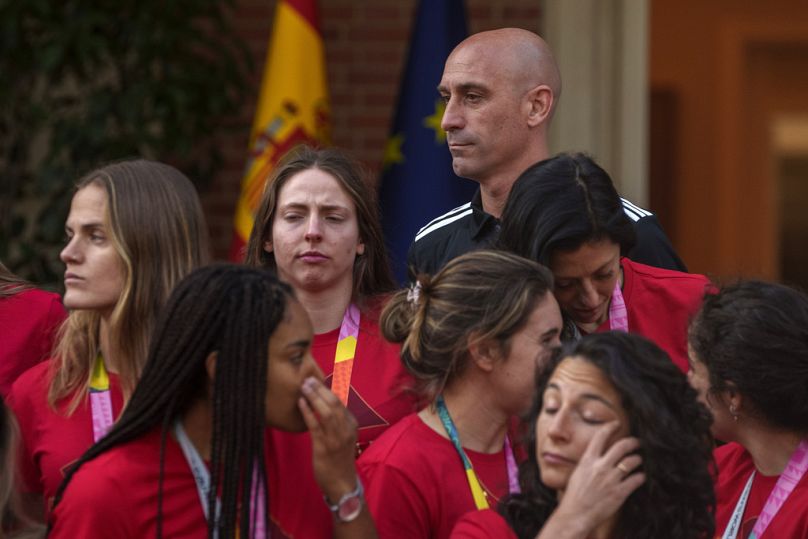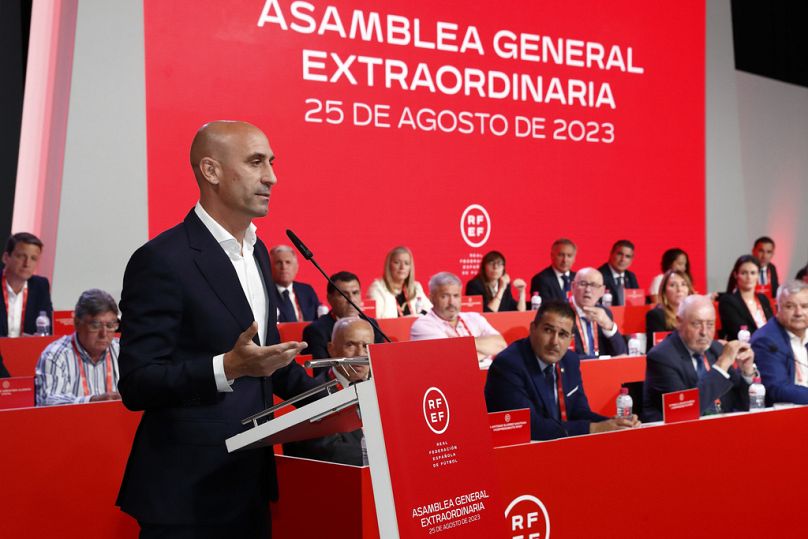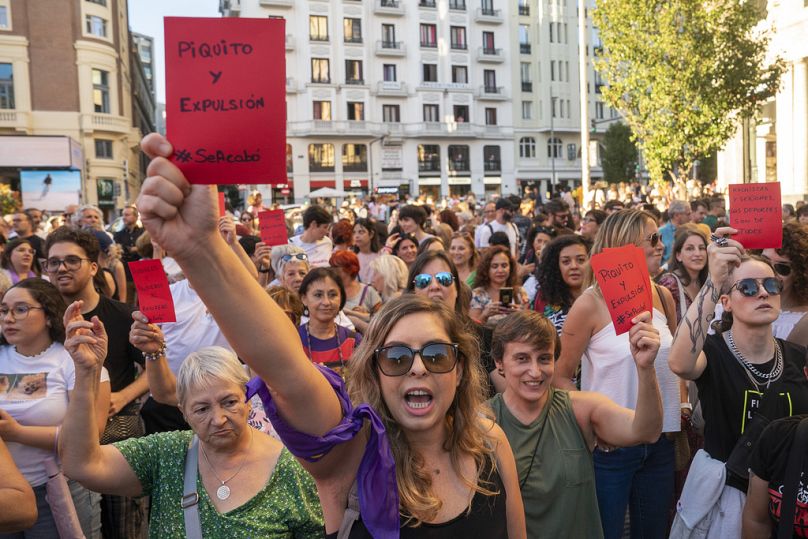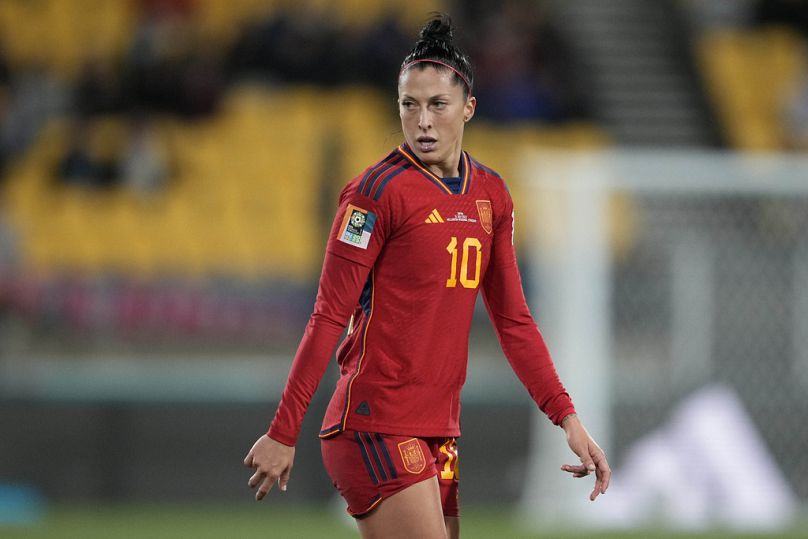Luis Rubiales held tight to his position as the most powerful man in Spanish football. The internal structure of a "feudal dictatorship" and the pressure exerted on Jenni Hermoso made this possible.
Ever since Luis Rubiales kissed Spain's Jenni Hermoso on the lips after the Women's World Cup final in Australia, everything around him has fallen apart.
But the most powerful figure in Spanish football clung on to his position until this Sunday, when he resigned as head of the Football Federation.
After almost a month of controversy, the success of the women's team has been tarnished and the situation threatens to perpetuate sexism in the women's game.
During this time, the former president claimed that he was the victim of a witch-hunt and repeated up to five times that he would not resign, to the applause of the Spanish federation's leaders.
The decision to step down, which many in the country had hoped would come sooner, should help Spanish football put one of its most embarrassing chapters behind it.
It should also clear the way for Spain to get back on track with their bid to host the men's World Cup in 2030 alongside Portugal, Morocco and possibly Ukraine.
With Rubiales finally out, the big question is why he waited so long to step down.
Why was it so difficult to kick Rubiales out?
"Rubiales will defend his job to the death," Rafa Fernández, a sports journalist with Spanish broadcaster Onda Cero, told Euronews prior to the eventual resignation.
While waiting for Rubiales' resignation, many wondered why the Spanish federation did not take a stronger stance.
As a private organisation with no public funding, the RFEF can make independent decisions, even though it represents Spain in football competitions.
Its internal structure makes democratic decision-making difficult. It is governed by a 140-member assembly, which is weighted towards the 19 regional presidents. Of the 140 members, only six are women.
Most of the regional presidents applauded enthusiastically at the federation's extraordinary meeting when Rubiales announced that he would not resign.
Days later, they issued a statement unanimously calling for his resignation, but they did not activate the no-confidence vote that could remove him from office.
"They try to avoid it at all costs, it is a feudal dictatorship where a lot of money moves. They work like a closed family in which they want to maintain the internal structure," says Fernández.
"The big players who want to prevent this system from changing are themselves, who have found a way of living that pays," he adds.
Among them was Rubiales, who earned €371,000 a year (net) as RFEF president, plus €250,000 from UEFA. The federation also payed him a €3,000 per month housing allowance.
Who had the power to sack Rubiales?
Following FIFA's decision to suspend Spain's football chief for three months, the Spanish federation held an emergency meeting.
"If it hadn't been for that, Rubiales would remain president, but this decision has blown him out of the water," said Fernández.
From then on, there was talk of a possible no-confidence vote, the only way to oust him internally.
According to the Onda Cero journalist, the no-confidence vote would have needed the support of a third of the assembly to be tabled and two-thirds, or 94 votes, to pass.
"The problem is that it requires consensus and at the moment there is a lot of internal disagreement. For this to happen, they needed time and a candidate who can build consensus," says Fernández.
One option would have been Pedro Rocha, the interim president since Rubiales' suspension, although he was part of the hardcore of Rubiales supporters who still control the federation.
"The 19 territorial presidents are the ones responsible for planning the new roadmap. How can it be that in the biggest crisis facing the federation, they are the only ones to decide? Because they are the ones who need this system to survive," he adds.
Although the internal route seemed unlikely, there was an external one.
Spain’s Higher Council for Sports (CSD) had referred the complaint against Rubiales to the Sports Administrative Court (TAD), which has sanctioning powers. The CSD could have suspended Rubiales from his duties while the case was resolved.
After Spanish prosecutors opened the door for him to face criminal charges and even possible jail time if convicted, Rubiales finally agreed to resign.
What about the possible sexual aggression allegations?
Prosecutors at the Spanish National Court have opened an investigation against Rubiales to see if there is enough evidence to charge him with sexual assault.
The office has the power to investigate crimes committed abroad, as Jenni Hermoso filed a formal complaint last week to move the case forward.
The offence carries a prison sentence of between one and four years, but this is only an initial investigation by the prosecutor's office to determine whether there is sufficient evidence to file charges.
Sexual abuse - the French football connection
"Come to my place for dinner tonight." "I prefer blondes, so if you're up for it..." "You're quite fleshy, I would definitely let you into my bed."
Just six months ago, Noël Le Graët, the strongman of French football and president of the French Football Federation, found himself on the ropes after a devastating audit revealed his centralised exercise of power and inappropriate behaviour towards women.
It all began when So Foot magazine published extracts of sexual messages allegedly sent by Le Graët to female employees.
The French Ministry of Sport commissioned an investigation by the General Inspectorate, which took five months to complete. The Paris prosecutor's office also became involved, opening a preliminary investigation into moral and sexual harassment.
Much has been written about one of the most sordid episodes in French football.
Journalist Romain Molina's report, based on interviews and footage, showed that Le Graët was only the beginning of the French federation's abuses.
He uncovered several cases of sexual abuse, blackmail and harassment, including of underage players, involving coaches, scouts, agents and senior officials working in the French top flight.
The former president of the French federation finally resigned in February last year after clinging on to his post for as long as he could.















